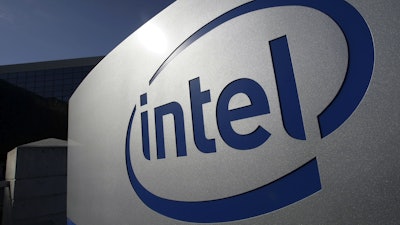
NEW YORK (AP) — Nvidia, the world's leading chipmaker, announced on Thursday that it's investing $5 billion in Intel and will collaborate with the struggling semiconductor company.
The two companies will team up to work on custom data centers that form the backbone of artificial intelligence infrastructure as well as personal computer products, Nvidia said in a press release.
Nvidia said it will spend $5 billion to buy Intel common stock at $23.28 a share. The investment, which is subject to regulatory approvals, comes a month after the U.S. government took a 10% stake in Intel.
"This historic collaboration tightly couples NVIDIA's AI and accelerated computing stack with Intel's CPUs and the vast x86 ecosystem — a fusion of two world-class platforms," Nvidia CEO Jensen Huang said. "Together, we will expand our ecosystems and lay the foundation for the next era of computing."
The two companies said they will work on "seamlessly connecting" their architectures.
In morning trading, Intel shares jumped 25%, its biggest one-day percentage gain in decades. Nvidia shares added 2%.
For data centers, Intel will make custom chips that Nvidia will use in its AI infrastructure platforms. While for PC products, Intel will build chips that integrate Nvidia technology.
The agreement provides a lifeline for Intel, which was a Silicon Valley pioneer that enjoyed decades of growth as its processors powered the personal computer boom, but fell into a slump after missing the shift to the mobile computing era unleashed by the iPhone's 2007 debut.
Intel fell even farther behind in recent years amid the artificial intelligence boom that's propelled Nvidia into the world's most valuable company. Intel lost nearly $19 billion last year and another $3.7 billion in the first six months of this year, and expects to slash its workforce by a quarter by the end of 2025.
The U.S. government stepped in last month to secure a 10% stake, making it one of Intel's biggest shareholders. Federal officials said they invested in Intel in order to bolster U.S. technology and domestic manufacturing.
The deal is "bullish for U.S. tech," Wedbush Securities analyst Daniel Ives said in a client note.
"This is a game-changer deal for Intel as it now brings them front and center into the AI game," Ives said. "Along with the recent U.S. government investment for 10% (equity stake in Intel) this has been a golden few weeks for Intel after years of pain and frustration for investors."
Nvidia, meanwhile, has soared because its specialized chips are underpinning the artificial intelligence boom. The chips, known as graphics processing units, or GPUs, are highly effective at developing powerful AI systems.
The deal between the two chipmakers comes as China moves to be less dependent on U.S. semiconductor technology. This week, Chinese officials reportedly forbade several large domestic technology companies from purchasing Nvidia chips, and Huawei announced that it was expanding its development of AI chips and manufacturing.
While Nvidia and Intel will work together to develop new chips, a manufacturing deal has yet to be struck between the two. The potential access to Intel's chip foundries by Nvidia poses a risk to Taiwan Semiconductor Manufacturing Company, which currently manufactures the tech giant's flagship processors.






















